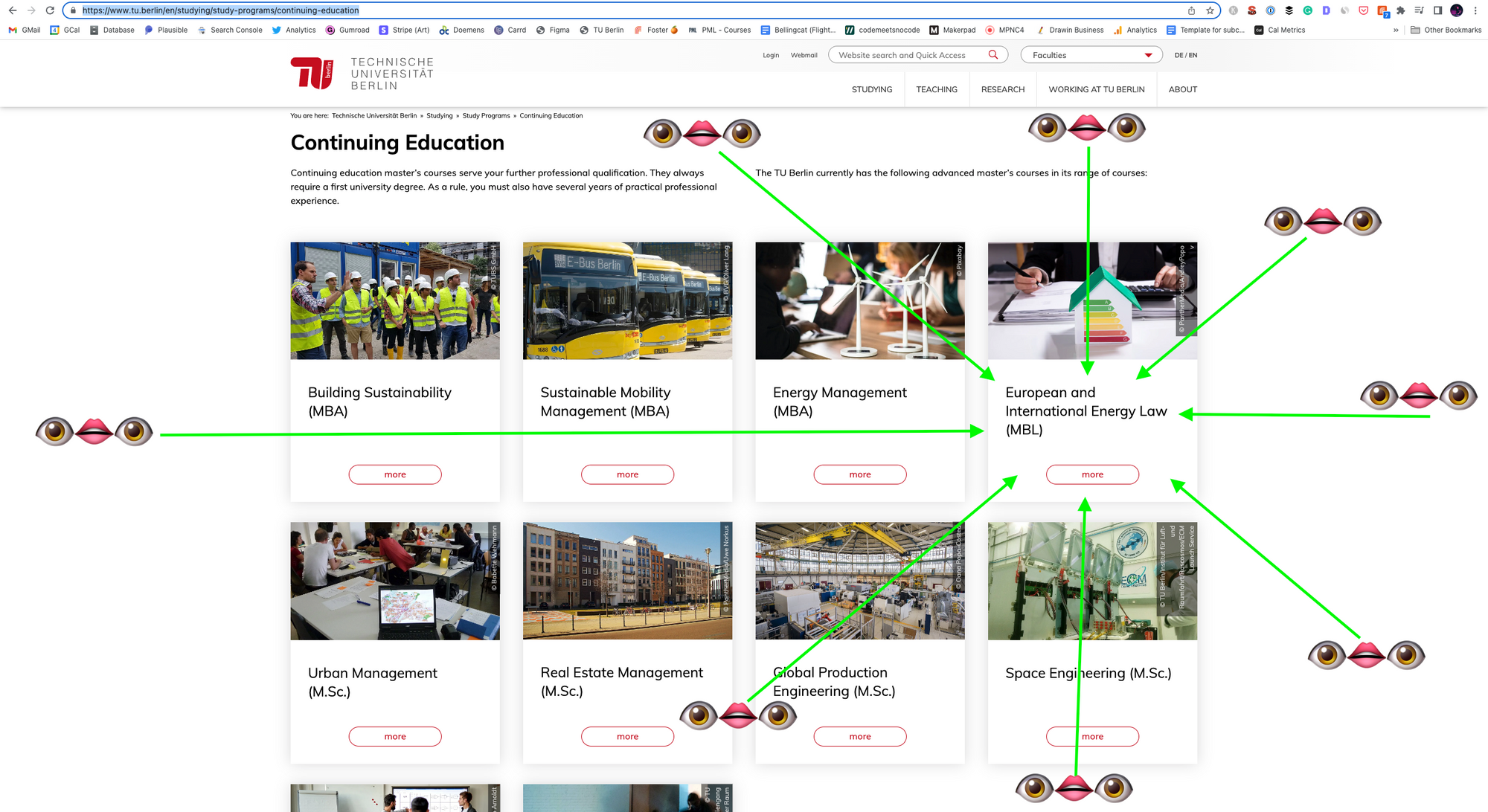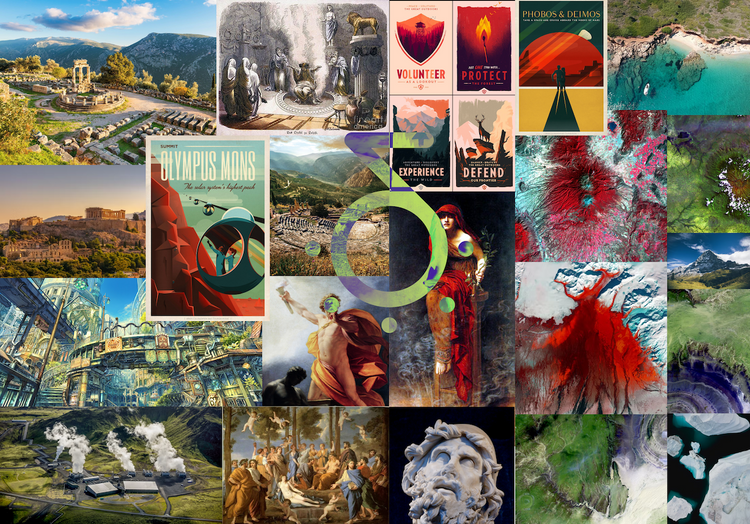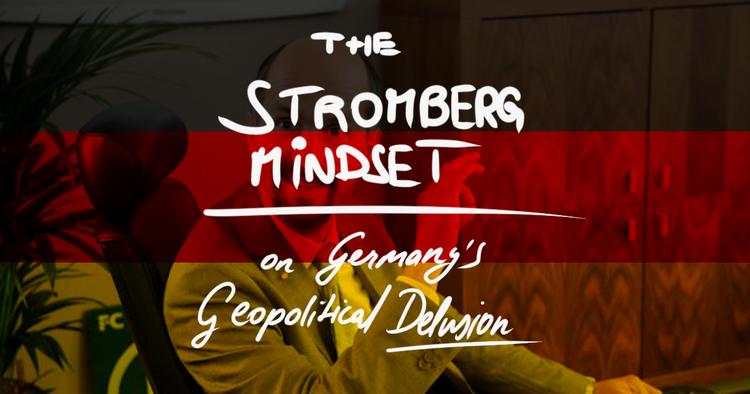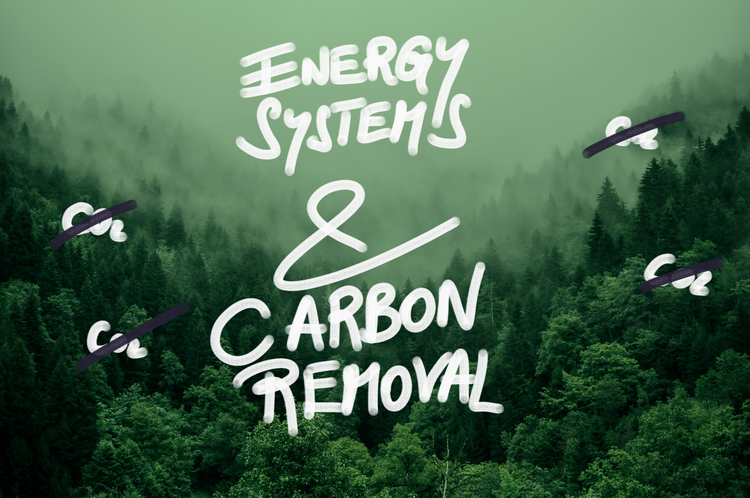Back to School: Why I Decided to Get a Law Degree at this Point in My Career ⚖️🔋

Hey ho, everyone 👋
Hope you're holding up amidst this dumpster fire of a year! I'd love to hear what's on your mind. As always, just reply via email or ping me on Twitter.
I'm Going Back to School: Why I Decided to Get a Law Degree at this Point in My Career ⚖️🔋
Alright... so the big news is that starting October 2022 I'll be going back to school.
Honestly, I would have never in a million years thought that I'd be doing this. After all, I already hold a Bachelor's Degree in Biz Admin and a Master's Degree in Marketing and Creativity (... yes, the degree was actually called like that).
Working for 10 years in the startup space as a venture builder, startup founder, tech executive (after selling our startup), and angel investor, I generally didn't see the need of going back to school.
Little did I know that 2022 would shuffle things around.
Exploring Climate Tech and Searching for My Edge
If you have read this newsletter for a while, you know that the beginning of Russia's invasion of Ukraine marked a complete reset for me. Let me explain.
After selling our business back in 2019, I stayed on as an executive with the acquirer until end of 2020. After that, I decided to take a sabbatical and experiment:
- 2021: Course Creation & Creator Life
- Early 2022: Indie Hacking and Personal Venture Studio
The beginning of the war forced me to think through my career path and I eventually arrived at the conclusion that I want to dedicate the next years of my life to climate and energy.
The first seedlings of this thinking process emerged back in March when I tried to understand how energy could be used as a weapon 👇
In the coming weeks, I'll work to understand the EU Energy System 🇪🇺
— Art Lapinsch 🔋 🌳 🛡 (@artlapinsch) March 18, 2022
😵 Risks
📊 Players
🔮 Opportunities
Please share any accounts, info, etc. I should look at 🙏
Particularly in regards to EU policy & security. Below is my first post in this series.https://t.co/F8k6ukKqNd
This was the deepest rabbit hole I ever fell into. First, I absorbed, then I started writing about systems thinking and optimism through climate tech. The more I learned, the more I was convinced. This is it!
My initial thinking was to learn and document what I had learned. That way, I would have a portfolio to show. It would come in handy regardless of what I'd want to do further down the road.
Still, there was one nagging thought: Where is my leverage in all of this?
Yes, I have startup experience and operational experience... but where exactly is my unfair advantage if I don't have the hard skills that relate back to one of the problem areas (climate change, engineering, energy systems, etc.). I was a business generalist after all.
The Moment of Serendipity
Fast forward a couple of months, and by now I had been writing quite a lot of long-form essays about climate and energy:
- How a Net Zero future could look like
- Why we finally see more climate-positive policies
- Why energy security is just like a diet
If you are at a house party and want a conversation to end, just start talking about these topics 👆 It's not the kind of stuff that usually gets people excited... but for whatever reason, I'm obsessed with these topics.
By now, my mind is primed to see most things through the lens of climate or energy.
So then one night in August, I was lounging in my bed and browsing the internet for degrees related to these topics. Ideally, (a) it wouldn't be something where I would have to start from square one, and (b) it could leverage my existing skills.
There I was laying and somehow - don't ask me how - I ended up on TU Berlin's website for continuing education. This is what it looked like from my perspective:

European and International Energy Law. 🇪🇺 + 🌎 + 🔋 + ⚖️
It made so much sense.
I checked the program info and the serendipity unfolded:
- Program: The syllabus was one of the tightest academic programs I've seen in my life. 👌
- Complement: This is a mixture of a law degree with elements of economics, policy, and fundamentals of energy systems. Someone told me: "No one wants to be the regulatory person in a startup." ... I'm happy to play that part.👌
- Faculty: Most of the instructors and profs are consulting the German government and the EU (European Commission; etc.) on energy and climate matters. Hence, a lot of practical insight from the front lines of the energy crisis. 👌
- Duration: Oct'22 - Jun'23 ... time flies these days so it's not even a crazy long commitment. 👌
- Location: The campus is 7 minutes walking from my apartment in Berlin. I checked by walking it. 👌
- Application:
The application deadline had ended in April and I had missed it.😭 ... I was already scheming to spam everyone in the faculty to let me participate despite me having missed the deadline... but luckily I clicked on the "apply now" button which led me to an application platform and there they had actually opened up a late admission deadline which gave me five more days to apply 😮
What the hell was going on. This was serendipity at its finest. So I applied.
My Motivational Letter
I wrote this one pager to summarize my motivation:
Dear Selection Committee,
The current war in Ukraine changed my life.
I was born in the Soviet Union, and my parents escaped the economic downfall by moving to Yugoslavia. In 1992, we were forced to flee the Yugoslavian Civil War as refugees. My mother is Russian, my father is Latvian, and we have many friends in Ukraine. I’m an Austrian citizen and a European at heart. This war in Ukraine is very personal to me.
When the Ukraine war started on February 24th, it was the first time in my life that I felt the strong combination of anger, helplessness, and desire to resist. First, I created a website (ukraina.guide) for refugees of the Ukraine War - a collection of helpful links for people in need. It was the least I could do. Two weeks later it was done and I started following the news cycle. What really surprised me was Germany’s slow and restrained response to the war.
I continued reading about the policy implications of Germany’s Ost-Politik, their approach of “Wandel durch Handel”, and their eventual reliance on energy imports from Russia. It clicked.
Energy Policy = Security Policy
Since Germany is an economic and political powerhouse within the EU, its energy-political path dependence turned out to be a liability for the entire European community. This was fascinating and scary at the same time. The door to the rabbit hole opened up right in front of my eyes.
What followed was self-directed research into systems thinking, the fundamentals of energy systems, and climate tech. All pieces started clicking into place and it crystallized what I should focus on in the coming years: playing my part in solving the climate and energy crisis.
This crisis checks many boxes for me: (1) it is the biggest challenge of our generation, (2) it has huge ramifications on national and international security, and (3) it presents a colossal entrepreneurial opportunity. The world’s energy transitionis the key to unlock our net zero future and the de-carbonization of the grid has to be one of its main drivers.
On top, all complex systems have inertia. To change such a complex system one must push many leverage points at once. On a societal level, this means activating policymakers, the market, and civic leadership. I understand the latter two and am determined to grasp the dynamics of policymaking and regulation.
The syllabus and faculty staff of this master’s degree look like the perfect conduits to solving the outlined challenges above. Hence, I would love to receive this world-class education, learn from my peers, and start playing a small part in Europe’s energy transition. I have a feeling that the 2022 cohort will be a very special one.
I dedicated the past decade of my life to tech startups. First, as a venture developer, then as a startup founder, and most recently as an executive in a large tech company. I could have continued on this path, but I can’t. I see it as my duty to play a small part in our journey to Net Zero. The next decade of my life will be dedicated to the climate and energy crisis.
Arguably, there has been no better time to study energy systems and the laws that govern them. The clock is ticking and the situation is unfolding. In Ukraine, in Europe, and on our planet as a whole. It’s time to act.
I would be extremely grateful if you would give me the chance to participate in this unique program and start playing my part in solving the climate and energy crisis.
Thank you,
Art Lapinsch
A couple of days later I received my acceptance letter 🎉
Ya boy is going back to school.
— Art Lapinsch 🔋 🌳 🛡 (@artlapinsch) July 18, 2022
International and European Energy Law @TUBerlin ⚡️
Climate change and energy security have been throwing nut flicks left and right.
Time to learn and play my part in the energy transition. pic.twitter.com/dCxZD080cY
When life throws you keys, you pick them up and open up the doors that you find.
Expectations and Goals
Here are some goals I have in mind:
- Problem Space: Understand the edges of the map. What is interesting to explore? In which problem area can I have the biggest positive impact?
- Pockets of Excellence: Identify the true world-class faculty members and see if I can be of any help in their research/work and by doing so learn from them. One example is Prof. Tom Brown - he's running the energy systems modeling faculty.
- Opportunities: Keep my eyes open and swing the bat at the right moment... whatever that might be.
Do you have any recommendations? Any hints?
I'm super excited and expect more content around climate tech and energy systems. I'll make sure to make it humanly readable 😄
[Reader Question] What Are Opportunities in Climate Tech?
My friend Jan - reader of this newsletter - asked me yesterday:
- What is an overview of opportunities in climate tech?
- What is overcrowded and where do you find greenfield opportunities?
What's overcrowded?
I'll start with this one.
The one place that seems to be more crowded than others are pure software plays. Anything where you act as a matchmaker (carbon trading; carbon offsetting; etc.) without actually touching and managing actual hardware and physical processes is more competitive.
Why? The barriers to entry are lower because you don't have to do the difficult part (bits vs. atoms).
Overview of Opportunity
There are a couple of ways I would think about this.
Let's start by breaking down our paths to Net Zero into its constitutent parts:
- Reduce CO2 (demand side): Behavioral incentives to reduce consumption [policies; trends like thrifting/recycling; etc.]
- Reduce CO2 (supply side): Making the supply-side green [energy transition to renewables; EVs; efficiency in buildings and industrial processes; etc.]
- Remove CO2: Carbon removal
Bullet point #2 is where the dollars are currently at from an entrepreneurial perspective.
There is an existing demand for clean alternatives due to social or political pressures but there's not enough supply of clean energy/mobility/etc.
Supply-constrained markets are an entrepreneurial dream 👁👄👁
Just take this graph from the International Energy Agency (IEA), which models a Net Zero pathway by 2050. All these colored elements (electricity and heat; industry; transport; buildings; other) are going to zero.
You know what this means? All of those have to be substituted with clean alternatives.
TL;DR: The market opportunity is pretty much the size of the entire economy.

If you want to play your part in our journey to net zero just find an area that you are excited about and start learning. Every helping hand is needed.
If you work in food & beverage → look supply chains; waste reduction; synthetic alternatives; etc.
If you work in retail consulting → look at supply chains; materials; logistics; demand adjustments; etc.
If you work in tech → look at data centers; narratives; media; etc.
... the list goes on. But where to begin?
Where to Begin
Here are some of the most helpful resources I have found:
- Speed & Scale: Buy the book. It's a quick read and their technology progress tracker gives you an insight for market opportunities. (h/t Skander for recommending)
- Tracking Clean Energy Progress: The IEA has a very detailed progress tracker where they break down what needs to be done to get to Net Zero. Opportunities galore.
- Project Drawdown: A think tank of sorts focusing entirely on finding the highest-leverage opportunities in reducing CO2 emissions. Their solutions database is a venture analysts dream. (h/t Nik for the recommendation)
- Climate Buddies: I created a Twitter list where I collect interesting people working to unfuck the planet.
- My Climate Journey (podcast & community): I started listening to the podcast and joined their Slack community ($100/yr) last week. It's like getting access to the inbox of 2000+ well-intentioned climate folks working across all areas. Amazing community, highly recommended.
- Delphi Zero: This is my climate tech & energy systems focused newsletter. I'm trying to build the "Waitbutwhy for climate" → Entertain to educate. (h/t Corey for this killer quote)
I hope this helps you to get started 🙌
Let me know if you have questions/feedback/critique/etc. Happy to riff on any of this!
Even if the world is rumbling it helps to remember: it's all a matter of perspective.
From where I stand, the glass is half full. All the good little things add up in the end 🌍
Stay healthy, stay happy 🙌
Art




